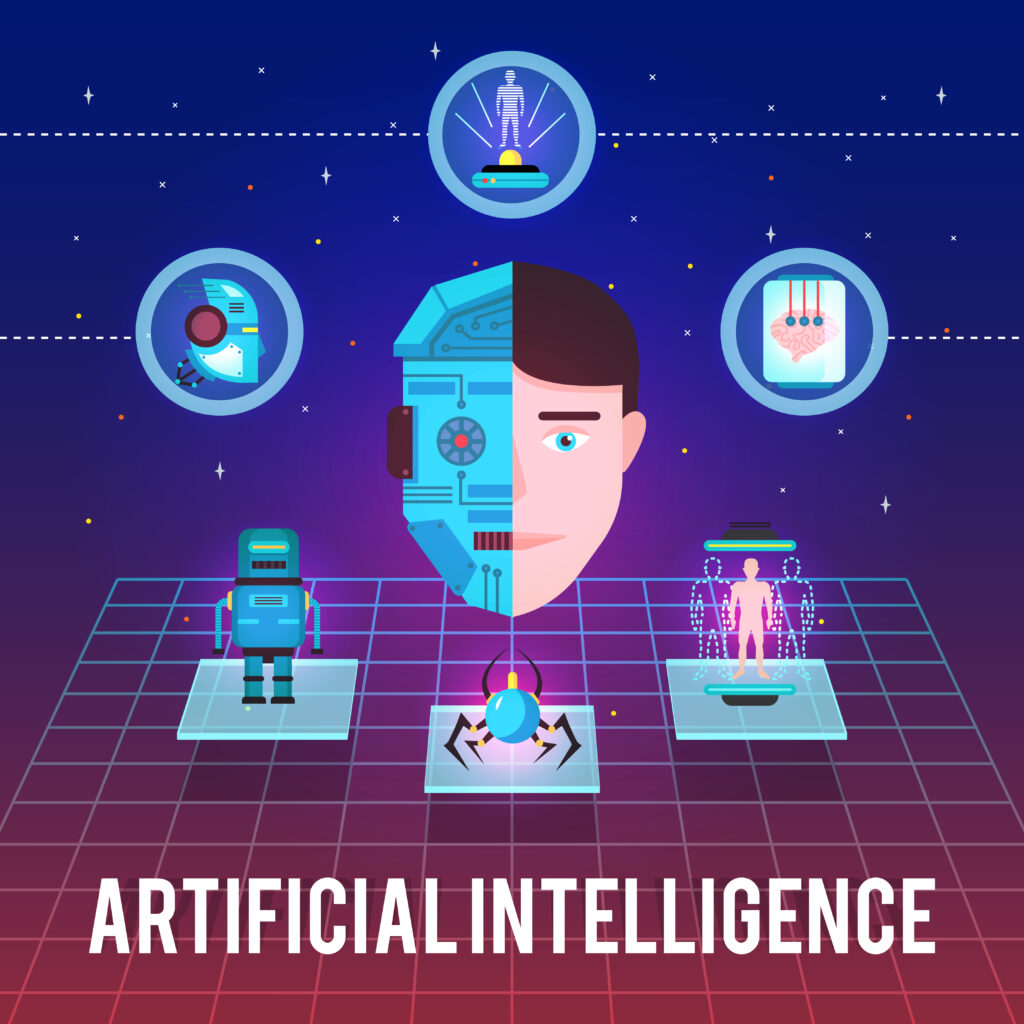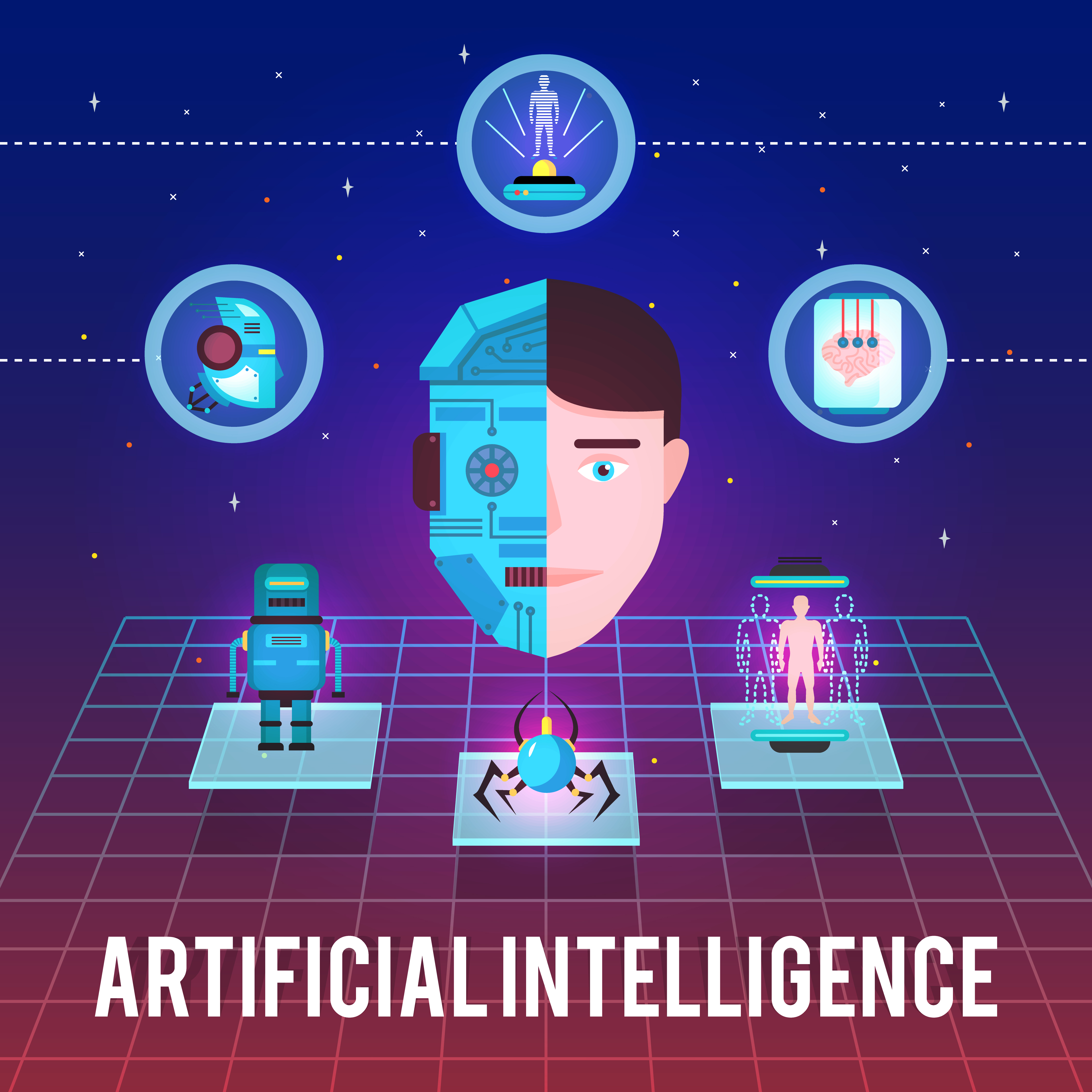In the ever-evolving landscape of technology, Artificial Intelligence (AI) has emerged as a transformative force. Its applications span various industries, and one sector that has particularly embraced AI is marketing. Marketers are utilizing AI to optimize their strategies and reach their target audiences more effectively. However, AI is not a monolithic entity; it comes in different forms, each serving a unique purpose. In this article, we’ll explore the four main types of AI and delve into how marketers are leveraging them to gain a competitive edge.

Understanding the Types of Artificial Intelligence
Artificial Intelligence is a multidimensional field, and its various forms can be classified into four primary categories:
1. Narrow or Weak AI (Artificial Narrow Intelligence – ANI)
Another different types of AI is Narrow AI, also known as Weak AI, refers to AI systems designed and trained for specific tasks. These systems excel in a predefined area but lack general intelligence. They do not possess consciousness or the ability to think beyond their designated function. Narrow AI is prevalent in the marketing world, where it is applied in tasks like data analysis, chatbots, and recommendation engines.
How Marketers Use Narrow AI:
Chatbots: Chatbots powered by Narrow AI can engage with website visitors, answer common queries, and guide them through the sales funnel. These chatbots provide 24/7 support, enhancing the user experience and ensuring potential customers receive timely responses.
Recommendation Engines: Online retailers heavily rely on Narrow AI-driven recommendation engines. These systems analyze user behavior, purchase history, and preferences to suggest products, thereby increasing sales and customer satisfaction.
Ad Targeting: Narrow AI is used to optimize digital advertising campaigns. It analyzes user data to deliver personalized ads to the right audience, thereby improving click-through rates and conversion rates.
2. General AI (Artificial General Intelligence – AGI)
General AI, often referred to as Strong AI, is the pinnacle of artificial intelligence. These systems possess human-like cognitive abilities and can perform tasks that require intelligence and understanding, similar to the capabilities of a human being. However, true AGI is still a theoretical concept, and we are currently far from achieving it. While AGI has tremendous potential, it is not yet widely used in marketing due to its complexity and the current lack of practical implementation.
How Marketers Could Use General AI (Future Possibilities):
Content Creation: AGI systems could potentially generate high-quality marketing content, including articles, videos, and advertisements, by understanding human emotions, context, and creativity.
Strategy Optimization: General AI could develop comprehensive marketing strategies by analyzing vast amounts of data, predicting market trends, and adapting to changing consumer behaviors in real-time.
Customer Engagement: AGI-powered virtual assistants could provide highly personalized and context-aware interactions with customers, enhancing brand loyalty and driving sales.
3. Machine Learning
Machine Learning (ML) is a subset of AI that involves training algorithms to learn from data and make predictions or decisions without explicit programming. It is a dynamic and rapidly evolving field, with numerous applications in marketing.
How Marketers Use Machine Learning:
Predictive Analytics: ML algorithms can analyze historical data to predict future trends, helping marketers make informed decisions regarding product launches, pricing strategies, and advertising campaigns.
Customer Segmentation: ML enables marketers to segment their audience more effectively based on behavior, preferences, and demographics. This allows for more targeted and personalized marketing efforts.
Content Recommendation: Machine Learning algorithms power content recommendation systems, such as those used by streaming platforms like Netflix and music services like Spotify. Marketers can also leverage this technology to recommend products or content to their audience.
Anomaly Detection: ML can identify unusual patterns in data, helping marketers detect fraud or suspicious activities. This is particularly useful in e-commerce to prevent fraudulent transactions.
4. Deep Learning
Deep Learning is a subset of Machine Learning that focuses on neural networks with many layers, also known as deep neural networks. It has gained significant attention and is known for its ability to process vast amounts of unstructured data, making it invaluable in the marketing world.
How Marketers Use Deep Learning:
Image and Video Recognition: Deep Learning algorithms excel in recognizing objects, faces, and patterns in images and videos. Marketers use this for visual search, sentiment analysis of images, and even in augmented reality applications.
Natural Language Processing (NLP): Deep Learning is at the core of NLP, enabling sentiment analysis, language translation, chatbots, and voice recognition. This is crucial for enhancing customer service and user experience.
Personalization: Deep Learning algorithms can analyze a user’s behavior, preferences, and interactions to provide highly personalized product recommendations, emails, and advertisements.
Marketing Automation: Deep Learning can automate marketing tasks such as email campaigns, social media posting, and even content creation by generating text or video content based on user data.
What Marketers Are Using Most
With these different types of AI at their disposal, what are marketers using most to gain a competitive edge? The answer depends on their specific goals and the resources at their disposal.
Chatbots and Recommendation Engines: Many marketers are harnessing the power of Narrow AI for improving customer interactions and driving sales. Chatbots provide immediate assistance, while recommendation engines increase cross-selling and upselling opportunities.
Machine Learning for Predictive Analytics: Marketers rely on Machine Learning algorithms to make data-driven decisions, predict trends, and allocate resources effectively. Predictive analytics is instrumental in planning marketing campaigns and optimizing budgets.
Deep Learning for Personalization: Personalization is a key trend in marketing. Deep Learning allows marketers to offer highly individualized experiences to their customers, from tailored product recommendations to personalized content.
Natural Language Processing (NLP): In the era of digital communication, NLP is crucial. Marketers are using NLP for sentiment analysis to understand customer opinions and feedback. It also powers chatbots and voice assistants, enhancing customer support and engagement.
Conclusion
Artificial Intelligence has revolutionized the marketing landscape, offering marketers an array of tools and techniques to engage with their audience more effectively and make data-driven decisions. The four primary types of AI – Narrow AI, General AI, Machine Learning, and Deep Learning – each bring unique capabilities to the table, allowing marketers to tailor their approach to their specific needs and goals.
Narrow AI, with its specialized capabilities, is the most prevalent in the marketing world. It powers chatbots, recommendation engines, and ad targeting, enhancing user experiences and driving sales. As technology advances, different types of AI in marketing holds promise, offering potential benefits such as content generation, strategy optimization, and personalized customer engagement.
Machine Learning and Deep Learning have gained immense popularity for predictive analytics, customer segmentation, personalization, and natural language processing. Marketers are harnessing the power of these AI subsets to gain a deeper understanding of their customers and deliver more relevant content and products.
As AI technology continues to evolve, marketers must stay up-to-date with the latest developments and adapt their strategies to remain competitive in an increasingly data-driven and AI-powered marketing landscape. By leveraging the right type of AI for their needs, marketers can enhance customer experiences, drive sales, and ultimately achieve their marketing goals.
Related Articles:
1. Best Examples of AI in Marketing: Tools & Best Practices
2. 4 Types of AI: Getting to Know Artificial Intelligence
3. Understanding the 4 Types of Artificial intelligence




